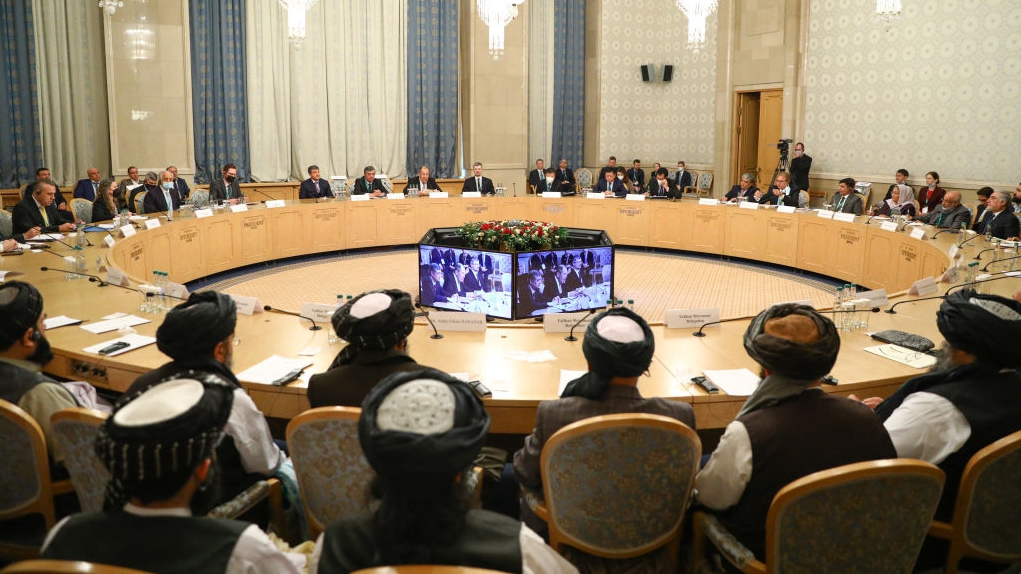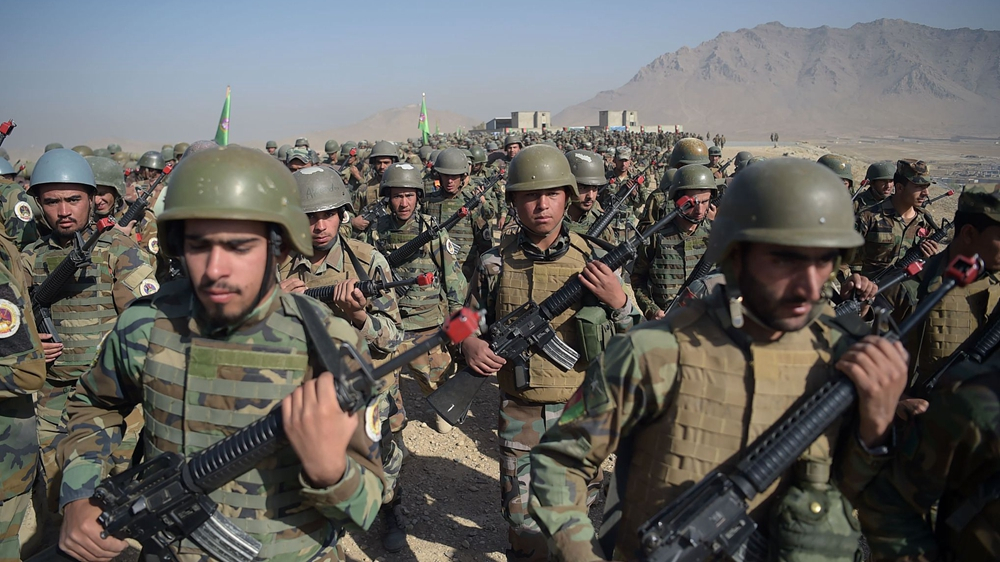
An international conference on Afghanistan is held in Moscow, Russia, March 18, 2021. /Getty
An international conference on Afghanistan is held in Moscow, Russia, March 18, 2021. /Getty
Editor's note: Bobby Naderi is a London-based journalist, guest contributor in print, radio and television, and documentary filmmaker. The article reflects the author's opinions, and not necessarily those of CGTN.
After 20 years of violence and destruction, the U.S. government has begun withdrawing its troops from Afghanistan. The full-scale retreat coincides with the 20th anniversary of the September 11 terrorist attacks, which led to lengthy wars in the Middle East and Central Asia.
President Joe Biden's withdrawal timeline breaks with a proposed deadline brokered last year by the former Donald Trump administration with the Taliban. Under that deal, all foreign forces would have had to leave Afghanistan by May 1.
The Taliban, whose forces remain standing and continue to expand their control in rural areas, have not yet agreed to the new withdrawal date. They are promising a "nightmare" for U.S. troops in the months ahead, and who knows what the Pentagon's response might be.
Fewer troops, more drones, and so on
The U.S. may be withdrawing its forces by September 11, but the longest war in American history is not coming to a responsible conclusion. The Pentagon plans to keep at least two military bases after the official troop drawdown "for support and counter-terrorism duties."
It's a retreat to the lies and deception that have characterized this war right from the outset. The new mission creep is not about counter-terrorism or helping to rebuild the war-ravaged country. It's about the U.S. Central Command and intelligence agencies that have no intention to concede ground or lose the strategic foothold to their "deemed" geopolitical rivals China and Russia. It's about oil reserves in the former Soviet republics, and Afghanistan's tremendous deposits of iron, copper, cobalt, gold, and critical industrial metals, and obviously, pivoting to Asia.
Here is the strange thing. The warrior corporations care not at all about "the graveyard of empires." They just can't let go of their embarrassing failure and move on. The U.S. wants to stay and entertain through a privatized and downsized war and in cahoots with Special Forces, mercenaries, and intelligence operatives stationed on the ground.
The strategy is to outsource the current and future undeclared wars and drone assassination campaigns, hide the cycle of violence from the world's public opinion, and avert dissent when it consumes yet more lives. The clandestine errand may include air bases in the Persian Gulf region, which could provide a launching pad for long-range bomber and armed drone missions into Afghanistan.
Seeing through the game, the people of Afghanistan want peace and prosperity. All roads run through negotiations between the Taliban and the Afghan government as the only way of bringing security and peace to the war-torn country. That could only happen in cooperation with Afghanistan's neighbors and in the absence of U.S. Special Forces, mercenaries, and intelligence operatives.

Afghan National Army soldiers march during a military exercise at the Kabul Military Training Center on the outskirts of Kabul, Afghanistan, October 17, 2017. /VCG
Afghan National Army soldiers march during a military exercise at the Kabul Military Training Center on the outskirts of Kabul, Afghanistan, October 17, 2017. /VCG
Beyond the laws of humankind
The U.S. military has announced that it is shifting focus away from counterterrorism in Afghanistan and the Middle East towards so-called "great power competition" with China in the Asia-Pacific region.
This came after Biden declared on April 28 that the U.S. was in competition with China to "win the 21st century." Biden said he told Chinese President Xi Jinping that the U.S. plans to militarize the Asia-Pacific region as it does in Europe - "not to start conflict, but to prevent conflict."
To put it in perspective, the Biden administration's military provocations in the South China Sea and the Taiwan Straits are in breach of international law. Hyping the perceived threat from China is helping the Pentagon to justify more military waste. Its accountants and generals claim more is needed to confront China.
Ominously, the lessons of Afghanistan are being ignored. The imperial adventure in the Asia-Pacific region will do what the costly intervention has done in Afghanistan. It may expand unchecked naval powers, including deployment of the use of military force and related national security operations, causing significant strategic setbacks that could easily lead to implosions across the entire region.
Upon reflection, it should be clear that the loss of U.S. hegemony is an undeniable reality and Biden's unequivocal rhetorical stances about China can't change that. Regional countries want social and economic development through a partnership with China, not "great power competition," and certainly no new American defeatism. Foreign military intervention only advances the aims of those who profit from the circumstances.
In a co-dependent region struggling to build fraternity, economic cooperation and human security in collaboration with China, there is no place for foreign policies of exceptionalism, universalism, and self-interest. The U.S. is an outlier, out of place, and out of time. It can't solve the region's security problems.
Regional countries ought to own their challenges themselves, with a careful mix of hard and soft security instruments. It's an embrace of intervention and unilateralism to support any U.S. military presence in the region. If the history of Afghanistan is any indication, it is self-destructive to the safety and prosperity of its people.
(If you want to contribute and have specific expertise, please contact us at opinions@cgtn.com.)

